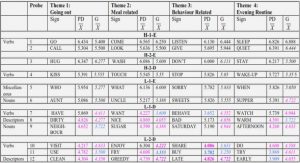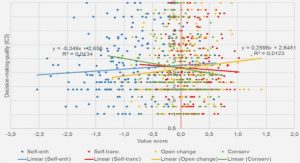Get Complete Project Material File(s) Now! »
Leading group – Forward translation:
First of all, a leading group had to be formed with two general practitioners (one of them was the local adviser), one linguist and one psychiatrist. This group was asked to perform the Forward translation of the WAI SR from English to Hebrew.
Each member had to be fluent in both languages and should have sufficient knowledge of both cultures.
Panel of experts – Delphi procedure:
The Delphi technique used a multistage self-completed questionnaire with individual feedback. Questionnaires were e-mailed to each participant, also called “experts”, and to avoid contamination, they were contacted separately (one of the main rules of the Delphi technique is to avoid “mailing list”). Experts signed a consent form and fulfilled a demographic form (information on their gender, age, information about their career as general practitioners, about their teaching and research activities, and their level in English).
These particular questionnaires were the translation of every items of the WAI SR (which included WAI SR Patient and WAI SR Therapist) with its original version in English and its new one in Hebrew. Experts were asked to rate each translated item using the Likert’s scale, where quotations go from 1 (total disagreement) to 9 (total agreement). Each evaluation under 7 would have to be explained, and suggestions could be made, which would be considered at the end of the round. Consensus was obtained when at least 70% of the evaluations of each items were equal to or exceeded 7.
Under 70%, another Delphi round for the particular item would take place (with a new translation taking suggestions into account), until consensus was reached for every item. More than one round could be mandatory. In the process, thirteen experts were involved in the first and only round needed. The data collection was done between November 2016 and August 2017. The Delphi procedure was over.
Linguists – Backward translation:
Two independent translators, different from the one of the leading group, were asked to perform a translation of the new Israeli WAI SR, back into English. Professional linguists were hired for this part of the survey.
Comparison – cultural check:
This English version was compared to the original version. The point was to make sure, the meaning of each item was still the same. If discrepancies were found, it would be discussed and words or sentences could be modified by the leading group. The emphasis should be on conceptual and cultural equivalence and not linguistic equivalence.(21)
First Round lead to consensus
The leading group translated into Hebrew the WAI SR Patient and The WAI SR therapist. In order to respect languages’ rules, they had to create a male and female questionnaire.
They submitted only one gender form (male). There were no different words between the gender versions other than the use of the feminine « you » and an additional letter to make verbs the feminine version. Every item of the WAI SR Patient and Therapist was validated after one round. A consensus was then reached. Note: The “IMPORTANT” line (item “IMPORTANT”) was translated and rated along with the “INSTRUCTIONS” paragraph (item “INSTRUCTIONS”).
Experts did not evaluate the Scoring sheet part, because it was translated afterwards, and the leading group did not consider accurate to submit this small part to the panel of experts. This was discussed and accepted by the TATA study scientific committee.
Backward translation and cultural check
The whole WAI SR Hebrew translation was submitted to 2 professional linguists who were hired in order to translate the Hebrew WAI SR back in English. They were asked to work together. The backward translation was compared to the original English version. Every item was considered accurate, the meaning was the same, except for the very last item, at the end of the Scoring sheet.
Table of contents :
Remerciement
Table des matières
Abstract
Introduction
Methods
Research group in Brest University of medicine.
Ethics statements.
Methodology
1. Leading group – Forward translation:
2. Panel of experts – Delphi procedure:
3. Linguists – Backward translation:
4. Comparison – cultural check:
Results
1. Characteristics of the leading group
2. Characteristics of the experts’ panel
3. First Round lead to consensus
4. Backward translation and cultural check
Discussion
1. Main Result
2. Strengths and limitations of the study
3. Key points
4. Implications for practice, medical training and further research
Conclusion
Bibliographie






